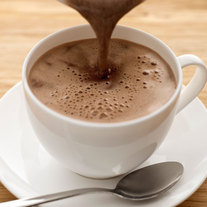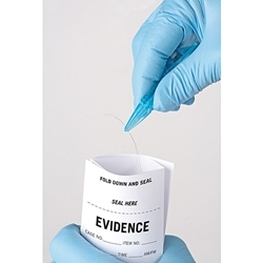- Home
- Videos
- Links
- Working with Interpreters
- Favorite Products
-
Newsletters
- December 2017
- December 2014
- June 2014
- March 2014
- December 2013
- November 2013
- October 2013 Newsletter
- July 2013 Newsletter
- June 2013 Newsletter
- March 2013
- February 2013
- January 2013
- December 2012
- November 2012
- October 2012
- September 2012
- August 2012
- July 2012
- June 2012
- May 2012
- April 2012
- March 2012
- February 2012
- January 2012
- November 2011
- October 2011
- September 2011
- August 2011
- July 2011
- March 2011
- February 2011
- January 2011
- October 2010
- September 2010
- May 2010
- April 2010
- March 2010
- September 2009
- May 2009 Remastered
- April 2009 Remastered
- February 2009 Remastered
- Healthy Body and Soul
- Upcoming Seminars
- More...
- COVID info for Medical interpreters
July 2013 Newsletter
In this Number:
Alcohol Regulation in the USA
Interpreting Without Voice
Translating the Purposely Ambiguous, Unclear, and Silly
What is a Digital Pen?
Cocoa Might Prevent Memory Decline
The Hagley Museum
Delaware Crime Lab
Alcohol Regulation in the USA
Interpreting Without Voice
Translating the Purposely Ambiguous, Unclear, and Silly
What is a Digital Pen?
Cocoa Might Prevent Memory Decline
The Hagley Museum
Delaware Crime Lab
Welcome!

It was a great pleasure to see you at the meeting. Xiaochuan, Catalina, and Alina were at the Brew Ha-ha and we discussed several interesting issues. Alina arrived a little late because she had to travel to take the oral and final portion of the Court Certification Exam.
At the meeting we talked about the history of prohibition in this country and how the states regulate the selling of alcohol. We talked about our fear of tests, our pre-exam rituals, and how difficult we all consider consecutive interpreting. I mentioned that at a recent seminar in Pennsylvania there was a Monterrey graduate with impeccable consecutive skills and I asked this interpreter about note-taking skills, (I always believed that note-taking was the key to good consecutive interpreting.) The interpreter responded that training at the University focused a lot on creating images in one's head and that the notes recorded the main idea of what was being heard. I learned a lot from that seminar especially that it is very important to create a balance between relaxed attention and note-taking in order to make sure that the note-taking process doesn't work against you. I hope my words helped. There are several videos and articles posted in past newsletters and on the Videos page that talk about this.
Richard, Linda, and Xiaochuan will not be at our August meeting due to their travels. Richard has bravely taken a journey up the Appalachian Trail, Linda is on a shorter yet beautiful vacation, and Xiaochuan is enjoying the rest of the summer visiting friends throughout America. I hope to see you all again soon.
Update: We've recently learned that Alina passed the test! Congratulations Alina on obtaining your Certification!
PROHIBITION IN THE UNITED STATES
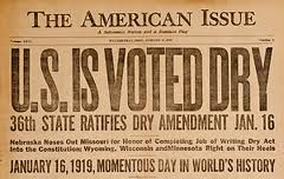
In the
United States there was a national ban on the sale, production, and
transportation of alcohol from 1919 to 1933. It was called “Prohibition” The ban
was mandated by the 18th Amendment to the Constitution. The Volstead
Act set rules for enforcing the ban and defined the types of alcoholic
beverages that were prohibited. Private ownership and consumption of alcohol
was not illegal under federal law, but many local laws were stricter and in some
states possession of alcohol was banned completely. Prohibition seemed to work at
the beginning but as time passed it became more unpopular, created controversy
within political and social settings, and brought about many side-effects such
as organized crime. Prohibition ended with the ratification of the 21st
Amendment, which repealed the 18th Amendment, on December 5, 1933.
Section 2 has been the source of every Supreme Court ruling directly addressing 21st Amendment issues. The 21st Amendment in its Section 2 was interpreted to essentially give states absolute control over alcoholic beverages, and many U.S. states remained dry. Many states now delegate the authority over alcohol granted to them by the 21st Amendment to their municipalities, counties, or both, which has led to many lawsuits over 1st Amendment rights when local governments try to revoke liquor licenses. Doctor's Prescription for the Use of Medicinal Liquor
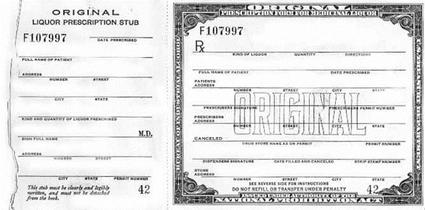 Courtesy of the Rex D. Davis Historical file, ATF Reference Library and Archive
During the prohibition years there was only one way to legally obtain alcoholic beverages. It was through a physician's prescription then purchasing the liquor from a pharmacy. Physicians could prescribe distilled spirits, usually whiskey or brandy, on government prescription forms. The government would allow the limited production and distribution of whiskey when stocks were low. Since ancient times there were widespread beliefs that alcoholic beverages had medicinal value. Those beliefs spread widely after the development of distillation techniques. Physicians prescribed alcohol for all sorts of treatments, from snake bites to disease control. By the early 19th century, especially in England, there was an extensive use of alcohol in medical treatments. The rise of scientific medicine after 1850 led to changing views, and by the end of the 19th century the therapeutic value of alcohol was disputed and discredited by many practitioners. In 1916 whiskey and brandy were removed from the list of scientifically approved medicines of The United States Pharmacopeia. In 1917 the American Medical Association voted in support of prohibition. The prohibition laws allowed medicinal use of alcoholic beverages through prescription and allowed the distribution of wine for sacramental purposes. WHAT IS A DIGITAL PEN?
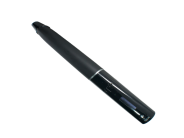
A digital pen or SMARTPEN is a pen that digitally records voices and writes with ink like a regular pen. It uses special digital paper, software applications, and developer-tools to combine the audio and writing and coordinates them all in an innovative manner to allow the user to retrieve the information in sections on-demand, save it on a computer, email it, etc.
Smartpens are essentially ballpoint pens with an embedded computer and digital audio recorder. When used with it's specific digital paper, it records and synchronizes those audio notes with the writings on the paper. This allows users to replay portions of a recording by tapping on the notes they were taking at the time the recording was made. I recommend the kit that comes with special earphones (the mic is in the earbuds so they record away from the scratching tip) and 2 notepads. You do not need to be connected to anything in order to use the SMARTPEN, but if you want to download information into your computer, know that there are two types of pens: wired and Wi-Fi. They both need to be charged with a cable to the computer, so if you want to save some money just get the wired version, but check before you purchase because these may not work with the newer iPads. WHAT IS IT GOOD FOR? The digital pen is a useful tool for practicing simultaneous interpreting and many trainers and interpreters call it a portable booth. The digital pen records audio and written notes at the same time, so the user can easily play back the recorded audio by simply placing the tip of the pen on the words or symbols the user wrote on the special paper while recording. Since the audio is recorded while writing, the user can play back the entire track or just single sections of the recording by tapping the desired section of the notes with the tip of the pen. The digital pen can be used for training or working. Although court interpreters are not allowed to use this device in the courtroom today, the digital pen is being used for depositions, business meetings, conference interpreting and community interpreting. In settings where recording equipment is frowned upon, always notify your client and request permission to use the digital pen. Translating the Purposely Ambiguous,
|
Why bringing any booze into or through Delaware is illegal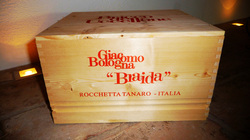
When you attend a conference in a country famous for producing great wines it is difficult to return without a few bottles for friends and family. But if you were to travel by car to a small vineyard, say in Pennsylvania, and wanted to bring home some souvenirs, you might find yourself in a barrel of trouble. You could get charged with smuggling, failure to pay tax, or other charges. The law that explains this type of action reads more or less this: Any individual wishing to bring into the state of Delaware alcoholic liquor which is not available through regularly licensed importers must: A. Notify and receive approval from the Commissioner a letter of intent, and identifying the "Port of Entry", date of arrival and cost. B. Ship by common carrier to a "Port of Entry". The common carrier must have a bill of lading with type of items, size, brands and amounts on it. C. Notify the Commissioner that the shipment of alcoholic liquor has arrived and have an agent from the Alcoholic Beverage Control Commissioner inspect, validate, and approve said merchandise. D. Pay the Delaware state tax and 25% enforcement fee which will be computed on the value of the alcoholic liquor. After making payment, the consignee will receive two copies of the realized purchase order. VI. EXCEPTIONS: A. This rule shall parallel federal regulations in that U.S. citizens are allowed to bring into the state of Delaware up to one liter per day of alcoholic liquor, days not cumulative. B. Any adult non-resident who is in transit and shall stay not more than 72 hours in Delaware is allowed to have tax free four liters of alcoholic liquor. C. Any adult non-resident who shall stay longer than 72 hours in the state of Delaware is allowed to bring in up to one liter of alcoholic liquor. D. Diplomatic, consular, and other privileged personnel have the privilege of importing alcoholic liquor free of tax. English/Spanish Federal Court Glossary
|





